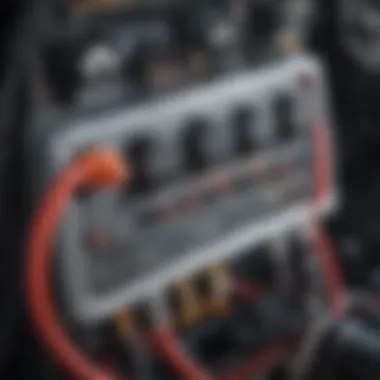Understanding Auto Repair Shops Specialized in Electrical Work


Intro
The world of automotive repair is vast and complex, particularly when it comes to electrical systems. As vehicles become increasingly advanced, the reliance on sophisticated electrical components has grown. This reality has led to the emergence of specialized auto repair shops focusing on electrical work. In this article, we will explore the significance of these establishments, the expertise required, common electrical issues encountered, and useful tips for choosing the right shop. Our aim is not only to enlighten readers on the critical nature of electrical repairs but also to guide consumers through their choices in automotive care.
Understanding this niche in the automotive industry involves not only recognizing the types of tasks these shops perform but also appreciating how these tasks impact overall vehicle safety and performance. This discussion will also touch on the advancements in technology and how they have reshaped automotive electrical systems, influencing both repair techniques and consumer expectations.
Foreword to Electrical Work in Auto Repair
The integration of electrical systems in vehicles has altered the landscape of auto repair. Understanding this specialization is essential for vehicle owners who seek reliable service. Electrical work encompasses various components that are crucial for the vehicle's performance, safety, and overall functionality.
In auto repair, addressing electrical issues requires not only specific skills but also an in-depth knowledge of how these systems operate. As vehicles become more dependent on electronics, the demand for skilled technicians who can diagnose and repair these systems has surged.
Key Areas of Focus:
- Importance of Electrical Systems: They are central to operations such as starting the vehicle, powering lights, and operating various electronic accessories.
- Significance of Specialized Skills: Technicians must have training in electrical diagnostics, as traditional mechanical skills are often insufficient.
- Considerations for Vehicle Owners: Choosing a shop that specializes in electrical work ensures that repairs are done efficiently and effectively, avoiding further complications in the future.
By exploring the role of electrical systems and the growth in their complexity within automobiles, vehicle owners can make informed decisions regarding their repair needs.
The Role of Electrical Systems in Vehicles
Electrical systems in vehicles are foundational to their operation. These systems control various essential functions from ignition to infotainment. Every electrical component, such as the battery, starter, and alternator, plays a significant role in ensuring that vehicles run smoothly.
Functions of Key Electrical Components:
- Battery: Supplies power to start the engine and supports the vehicle's electrical systems when the engine is off.
- Starter: Engages the engine to initiate the combustion process by drawing power from the battery.
- Alternator: Maintains electrical systems and charges the battery when the engine is running.
The complex interplay between these components illustrates the importance of expert knowledge in diagnosing and repairing electrical faults. Drivers should be aware that neglecting any issues in the electrical system can lead to more severe and costly repairs down the line.
Growth of Electrical Complexity in Automobiles
The complexity of electrical systems in modern vehicles has increased remarkably over the past few decades. With the rise of advanced technologies, manufacturers now integrate more electronic components than ever. Features such as infotainment systems, advanced driver-assistance systems (ADAS), and hybrid powertrains contribute to this complexity.
Notable Trends:
- Incorporation of Smart Technology: Features like adaptive cruise control and lane-keeping assist rely on intricate electrical systems.
- Hybrid and Electric Vehicles: These vehicles have different electrical dynamics, necessitating specialized knowledge for maintenance and repair.
- Integration of Diagnostic Tools: Many shops now use sophisticated diagnostic equipment to troubleshoot issues effectively.
As vehicles evolve, the need for qualified technicians who can navigate this complexity increases. Vehicle owners ought to recognize the importance of selecting a repair shop with the necessary expertise in automotive electrical systems.
Types of Electrical Work Performed by Auto Repair Shops
Understanding the types of electrical work performed in auto repair shops is crucial for maintaining vehicular performance. Electrical systems in cars are intricate, and specialized skills are necessary to manage various repairs. Recognizing these different types of services can aid car owners in making informed decisions when seeking repairs. Each task plays a significant part in ensuring safety and functionality on the road.
Battery Troubleshooting and Replacement
Batteries are the lifeblood of vehicle electrical systems. They power everything from starting the engine to running lights and accessories. Auto repair shops often begin with battery troubleshooting, identifying issues like decreased voltage or a faulty connection. A weak battery can cause poor starting or dim lights, leading to bigger problems down the line.
When replacing a battery, auto shops carry various brands, ensuring compatibility with different vehicle models. They test the old battery and components before installation, taking into account the vehicle's electrical needs. This step helps prolong the new battery's life and ensure that all electrical aspects work optimally together.
Starter and Alternator Services
Starters and alternators are vital components in turning a vehicle on and charging the battery. An issue with the starter can manifest as a clicking sound or no response when turning the ignition key. Repair shops possess the tools required for testing and diagnosing starter problems, often removing the component for an accurate evaluation.


Alternator services focus on ensuring that the electrical system charges correctly when the vehicle is running. Problems here often lead to a dead battery. Repair shops inspect wiring, connections, and the alternator itself, checking for wear or failure. Regular assessment of these parts can prevent unexpected breakdowns, which affect mobility and safety.
Lighting and Signal Repair
Vehicle lighting plays a critical role in safety during driving. Faulty headlights or turn signals can lead to accidents. Repair shops handle various lighting repairs, from replacing bulbs to fixing issues with the wiring harness. Understanding how lights function together is essential. For instance, a blown fuse can affect multiple lights in a vehicle at once.
Shops can also upgrade lighting systems to more efficient options, such as LED headlights, which provide better visibility and longevity. Customers need to seek out shops that focus on these types of repairs to ensure high standards in safety and functionality.
Wiring and Circuit Repairs
Wiring issues can create significant crises in a vehicle's electrical system. Problems such as frayed wires or corroded connectors lead to short circuits or system failures. Auto repair shops specialize in diagnosing these issues through detailed inspections. They check connections for continuity and perform repairs or replacements as necessary.
Proper wiring repair is essential to ensure that all vehicle systems operate correctly without interruption. Without addressing wiring issues, drivers may face complications in numerous electrical functions, including essential components like airbags and anti-lock braking systems.
Sensor and Module Diagnostics
Modern vehicles rely heavily on sensors and control modules. These components gather data about engine performance, transmission activity, and vehicle dynamics. Diagnosing problems within these systems can require sophisticated diagnostic tools and software. Repair shops are equipped to interface with these electronic systems, read codes, and determine underlying issues.
Effective diagnostics ensure that repairs target the right component. For instance, a malfunctioning sensor can lead to poor fuel efficiency or safety features not working as intended. This level of precision is essential for maintaining vehicle performance.
Through understanding the types of electrical work performed, vehicle owners can ensure they receive the best service for their vehicles. Repair shops specializing in these tasks offer not just repairs but peace of mind, knowing that their vehicles are safe and reliable.
Skills Required in Electrical Auto Repairs
Understanding the skills necessary for electrical auto repairs is crucial. These skills not only affect the efficiency and quality of repair work but also ensure the safety of the vehicle and its occupants. Comprehensive knowledge of automotive electrical systems is vital as these systems become increasingly complex with advancements in technology and design. Consequently, the auto repair specialists are often required to possess a high level of technical insight and practical skills.
Understanding Automotive Electrical Systems
Automotive electrical systems are intricate and multifaceted. They include various components, such as the battery, alternator, starters, and numerous sensors. A solid foundation in the workings of these systems is necessary. It allows technicians to diagnose problems effectively. Knowledge of the electrical diagrams specific to various car models is also essential. Understanding the operation and interaction of these components helps technicians address issues efficiently, minimizing the time the vehicle spends in the shop.
Moreover, the automotive industry frequently updates its technology. Newer models often incorporate advanced electrical features, making substantial knowledge about these systems even more necessary.
Technical Proficiency in Diagnostic Tools
Technicians must also demonstrate proficiency in using diagnostic tools. Modern vehicles often require specialized equipment to identify and resolve electrical issues. Tools like oscilloscopes, multimeters, and scan tools are now standard in the field. Understanding how to utilize these tools effectively ensures accurate diagnostics and avoids unnecessary replacements.
This technical ability can significantly reduce repair time and ultimately save costs for both the shop and the vehicle owner. Familiarity with software used for diagnostics can further enhance a technician's capabilities, enabling them to interpret data efficiently,
Problem-Solving Abilities
Problem-solving skills are essential in electrical auto repairs. When technicians encounter issues, they often need to troubleshoot beyond just surface-level symptoms. This may include tracing wiring problems, examining connections, and testing components. A methodical approach to diagnosing electrical problems is essential to uncover the root cause efficiently.
Technicians need to think critically, adapting their strategies to various electrical problems. Diverse vehicles can display electrical issues in different ways. Consequently, the technician's ability to analyze these situations quickly can lead to more effective repairs. Overall, problem-solving skills ultimately determine the quality of service provided by electrical auto repair shops.
"In the world of automotive electrical repair, specialized knowledge and skills drastically impact efficiency and safety."
These skills create a solid foundation for quality repair work. They reduce potential errors and enhance the overall maintenance experience for customers.
Common Electrical Problems Experienced by Drivers
When discussing auto repair shops, especially those that focus on electrical work, it is crucial to address the common electrical problems that drivers often face. Understanding these issues aids car owners in recognizing signs of trouble and, ultimately, selecting the right repair shop for their needs. Addressing electrical problems promptly not only enhances vehicle performance but also contributes to safety on the road.


Diminished Battery Life
A frequent issue experienced by drivers is diminished battery life. This can result from various factors, including prolonged usage, extreme weather conditions, or simply the age of the battery. A battery typically lasts around three to five years. When a vehicle struggles to start, it could mean that the battery needs replacement. Regular battery checks can prevent the inconvenience of being stranded. Visiting an auto repair shop for a battery test can help in identifying the problem early.
Starter Failure Symptoms
Starter failure shows a few distinct symptoms that drivers should be aware of. If the engine does not turn over despite the ignition being activated, it may indicate a starter issue. Other signs include clicking sounds when turning the key or dim lights during the starting process. These symptoms suggest that the starter motor might be failing, which requires immediate attention from a qualified technician. Ignoring these signs can lead to complete starter failure, which can affect the reliability of the vehicle.
Issues with Vehicle Lights
Another common electrical problem involves issues with vehicle lights. This could manifest as flickering headlights, dashboard lights that do not work, or malfunctioning turn signals. Such problems could be attributed to blown fuses, faulty bulbs, or wiring issues. Addressing these issues promptly is essential, not just for compliance with road safety but also to ensure better visibility while driving. It is advisable for drivers to consult an auto repair shop if they notice ongoing problems with their vehicle lights.
Malfunctioning Electrical Accessories
Electrical accessories, such as power windows, air conditioning units, and audio systems, can sometimes malfunction. Drivers often overlook these components until they fail. A malfunction might indicate wiring issues or problems with the vehicle’s electrical system. These issues can be particularly disruptive, as they can affect driving comfort and convenience. Regular maintenance checks at an auto repair shop specializing in electrical work can help catch these problems early, reducing the chance of total failure.
Choosing the Right Auto Repair Shop for Electrical Work
Choosing an auto repair shop that specializes in electrical work is crucial for maintaining your vehicle's performance and safety. With the increasing complexity of automotive electrical systems, it is vital to select a shop that possesses not only adequate technical knowledge but also the right tools and equipment.
It is important to consider the shop's qualifications and certifications to ensure they have the required expertise. An accredited shop will offer reassurance that their technicians have undergone proper training. Furthermore, assessing customer reviews and reputation can provide insight into past performance and level of service.
Lastly, inquiring about the technology being used at the repair shop gives the advantage of understanding whether they are keeping up with current industry standards. Having well-equipped facilities enables technicians to diagnose and repair problems more efficiently, giving you peace of mind.
Evaluating Qualifications and Certifications
Qualifications and certifications serve as benchmarks for a repair shop’s credibility. Certifications from organizations like the National Institute for Automotive Service Excellence (ASE) indicate that the technicians have met specific industry standards. This is fundamental for electrical work since it often requires intricate knowledge of system schematics and advanced diagnostic methods.
When evaluating a shop, you should check:
- Technician Background: Verify if they have relevant training in electrical systems.
- Certifications Obtained: Look for up-to-date certifications that reflect ongoing education efforts.
- Company Affiliations: Associations with reputable industry organizations can further signify reliability and competence.
Assessing Customer Reviews and Reputation
In today's digital age, customer reviews offer a window into the quality of service a repair shop provides. You can find these reviews on platforms like Yelp, Google Reviews, and even Reddit. Positive reviews often indicate customer satisfaction, while negative reviews can highlight common issues.
Consider the following factors:
- Consistency of Reviews: Look for a pattern in feedback; consistent praise or criticism is more telling than outlier opinions.
- Specific Service Comments: Customers may provide insights into the specific electrical work performed, which can guide your decision.
- Response to Reviews: How a shop responds to feedback, both positive and negative, shows their commitment to customer service and accountability.
Inquiring About Equipment and Technology Used
Modern automotive repair is evolving rapidly, particularly in electrical systems. Inquire about the equipment a shop uses for diagnostics and repairs. Shops with up-to-date technology, like advanced diagnostic software and specialized repair tools, often provide better outcomes.
Questions to ask include:
- Diagnostic Tools: What type of diagnostic equipment do they use? Look for modern, industry-standard tools.
- Repair Technologies: Are they using up-to-date methods and technologies for repairs? Outdated technology can lead to extended repair times and subpar results.
- Training on New Equipment: Ensure the staff is well-trained in the latest technology. Continuous training indicates a commitment to quality.
Choosing wisely can help ensure your vehicle's electrical systems are in reliable hands. A well-informed decision minimizes risks and enhances the longevity of your vehicle.
Preventive Measures for Electrical System Maintenance


Preventive measures for electrical systems are crucial in ensuring vehicle longevity and reliability. Many drivers often overlook the importance of regular maintenance concerning electrical components. By proactively addressing potential issues, it minimizes the risk of more severe and costly problems down the road. Preventive maintenance not only extends the life of key components but also enhances overall safety.
Regular Battery Checks
Regular battery checks serve as an essential preventive measure in maintaining a vehicle's electrical system. The car battery is the heart of electrical operations, powering components from starters to lights. Over time, batteries can lose charge or degrade due to corrosion or age. Conducting routine checks can identify weak cells or poor connections early on. This can prevent unexpected breakdowns and costly replacements.
Drivers should aim to inspect battery terminals for any signs of corrosion. It is also important to ensure that connections are firm and not loose. Regularly testing the battery's voltage with a multimeter is another effective method. Ideally, a fully charged car battery should measure around 12.6 volts. If it consistently reads lower, it may need recharging or replacement.
Routine Inspection of Wiring and Connectors
Routine inspection of wiring and connectors is another crucial aspect of preventive measures. Electrical failures often stem from damaged or worn-out wiring. Various factors can contribute to such issues, including exposure to heat, moisture, and vibrations over time. Inspecting these systems can uncover frayed wires or loose connections that could lead to short circuits and other malfunctions.
For vehicle owners, making it a habit to periodically check the wiring harnesses can save a lot of trouble. Potential signs of damage include discoloration, exposed metal, or noticeable wear. Ensuring that connectors are clean and free from rust or dirt is equally important. Clean connections improve conductivity, reducing resistance and electrical issues.
By prioritizing these preventive measures, vehicle owners not only improve the safety and functionality of their vehicles but also save on repair costs in the long run. Regular maintenance ensures peace of mind while on the road.
"Proactive measures are always better than reactive repairs when it comes to vehicle maintenance."
Regular battery checks and routine inspection of wiring are simple yet effective strategies. These practices enhance performance and reliability, reducing the risk of electrical mishaps. The value of focusing on preventive maintenance cannot be overstated.
The Future of Automotive Electrical Repair Shops
The automotive industry is evolving quickly, especially in the realm of electrical repair shops. The future of these shops is crucial due to the increasing reliance on electrical systems in vehicles. Modern cars are not just powered by engines; they depend heavily on intricate electrical systems that control everything from navigation to safety features. This reliance elevates the importance of specialized auto repair shops that can effectively address electrical issues.
One specific element shaping the future of these repair shops is the surge in vehicle electrification. With more consumers opting for electric and hybrid vehicles, repair shops will need to adapt their services and skill sets. This trend is not just a temporary shift; it reflects a broader industry transformation aimed at promoting sustainability and energy efficiency.
The benefits of adapting to these changes are significant for repair shops. Not only can they attract a new customer base drawn to electric vehicles, but they also stand to enhance their service offerings. Having the capability to repair and maintain electric vehicle systems can lead to increased revenue and improved reputation within the automotive community.
There are considerations though. Repair shops must invest in training for their technicians. Emerging technologies require a deeper understanding of sophisticated electrical systems. Ensuring technicians are well-equipped with the latest knowledge is essential for remaining competitive. As the market evolves, shops that prioritize continuous education on these technologies will flourish.
The automotive landscape is shifting towards electrical systems, leaving traditional repair methodologies behind. Shops must adapt or risk obsolescence.
Emerging Technologies in Vehicle Electrics
Emerging technologies are significantly impacting vehicle electrical systems and the capabilities of repair shops. Advances like smart diagnostics, predictive maintenance, and vehicle-to-everything (V2X) communication present new challenges and opportunities.
Smart diagnostic tools leverage artificial intelligence to analyze electrical system issues. These tools can streamline the repair process by quickly identifying faults rather than relying solely on manual diagnostics. This increases efficiency and can minimize downtime for customers.
Additionally, predictive maintenance allows shops to foresee potential failures before they occur. This not only enhances customer satisfaction but also builds trust between the mechanic and the driver. Shops using these technologies are more likely to catch small problems before they escalate.
Adapting to Electric and Hybrid Vehicles
As electric and hybrid vehicles become more prevalent, repair shops specializing in electrical work must adapt their strategies. Understanding the unique components of these vehicles is essential. This includes battery systems, regenerative braking systems, and electric motor diagnostics, which differ significantly from traditional combustion engines.
The complexity of electric vehicle systems requires repair shops to upgrade their equipment and training. Technicians should be comfortable with high-voltage systems and equipped to safely diagnose and repair them. Additionally, working with software updates for these vehicles is becoming more important as manufacturers increasingly rely on software for diagnostics and repair.
Repair shops that embrace this transition towards electric and hybrid vehicles will be at the forefront of the industry. They will not only serve current market demands but will also play a significant role in shaping automotive service in the future.
Culmination
Recap and Importance of Specialized Knowledge
Specialized knowledge in automotive electrical work encompasses various essential areas. First, it includes an in-depth understanding of electrical systems within vehicles, which is vital as these systems govern numerous functionalities, from starting the engine to operating safety mechanisms. Having a solid grasp of electrical theory is the foundation for effective diagnosis and repair.
Moreover, the technical proficiency in using diagnostic tools is another critical aspect. Mechanics must be adept in using equipment like multimeters and scan tools to accurately identify faults. This expertise allows for quick resolutions to complicated electrical issues, minimizing vehicle downtime.
Additionally, innate problem-solving abilities are essential. Technicians must swiftly analyze issues, often under pressure, and devise appropriate solutions. This capability fosters confidence among vehicle owners, who depend on these experts to keep their cars safe and functional.







